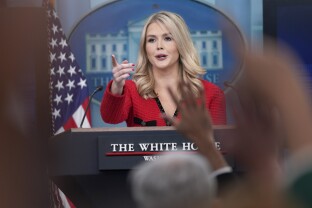White House press secretary Karoline Leavitt defended Elon Musk’s latest email to federal employees, which asked them to summarize what they’ve done in the last week — and also said the White House will defer to cabinet officials on whether their employees should respond.
Still, she insisted there is no tension between Musk, who oversees the Department of Government Efficiency and who she said would attend a cabinet meeting on Wednesday, and the rest of the Trump administration’s leadership.
“Let me be very clear, the president and Elon and his entire cabinet are working as one unified team,” she said at her press conference on Tuesday.
The email, which demanded a response by the end of the day on Monday, was accompanied by Musk tweets that said, “Failure to respond will be taken as a resignation.” Confusion promptly erupted. And some departments and leaders — Kash Patel of the FBI, the Department of Homeland Security — told employees explicitly to pause responses.
It left Leavitt toeing a difficult line. She painted the administration as both extremely supportive of Musk’s behavior, while simultaneously deferring to the leadership of cabinet secretaries — including when they’ve told their departments to ignore Musk’s email.
“It’s a very simple idea when you think about it. All the Office of Personnel Management is asking, all this administration is asking, President Trump is asking, is for federal workers who live off of the American taxpayer’s dime to send five bullet points of what they have done in the previous week,” she said, describing the ask of an OPM email that went out over the weekend.
Leavitt, meanwhile, said she had sent one herself, adding that it took her under two minutes. She noted that more than 1 million federal workers had also emailed.
Despite the confusion surrounding its rollout, the administration seems to like the idea — one Leavitt wholeheartedly credited to Musk (“Elon and DOGE came up with this idea,” she said). It’s a practice she said he’s implemented at his private companies that “has proven successful.”
Still, in several rounds of questions, she pointed to cabinet officials as the final authority.
“The president defers to his cabinet secretaries, who he’s obviously entrusted to pursue the guidance relative to their specific workforce, and for some of the agencies that you’ve seen who have said, ‘Please don’t send these emails,’ it’s in their best interest for that specific agency, and the president supports that,” Leavitt said.
She tried to make the case that these administration positions — of both supporting the effort and supporting directives to ignore it — come from a unified front as opposed to a disjointed one, in an effort to tamp down any suggestion of friction.
“Everybody is working as one team, and the president respects the decisions of his cabinet secretaries to tell his staff, their staff, not to respond to that email because they did so out of interest of national security,” Leavitt said.
When one journalist indicated that some cabinet secretaries were caught off guard by the email, Leavitt quickly interjected.
“Nobody was caught off guard,” she said.
—
Nuha Dolby is a NOTUS reporter and an Allbritton Journalism Institute fellow.
Sign in
Log into your free account with your email. Don’t have one?
Check your email for a one-time code.
We sent a 4-digit code to . Enter the pin to confirm your account.
New code will be available in 1:00
Let’s try this again.
We encountered an error with the passcode sent to . Please reenter your email.


